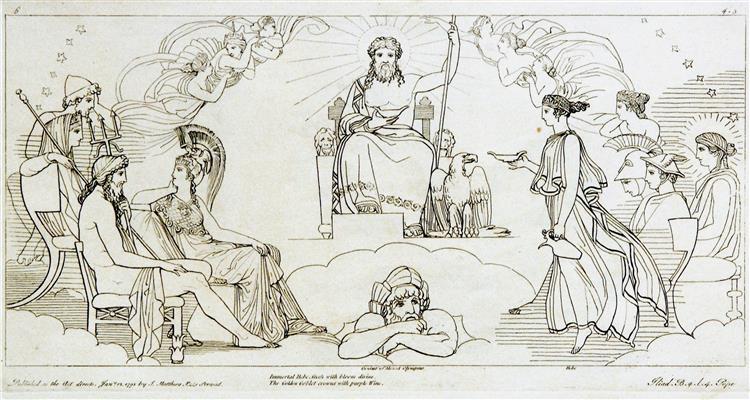AMBROSIA and NECTAR, the food and drink respectively (but the reverse occasionally) of the gods. Their effect is to make those who take them immortal (Pindar, Olympian Odes I. 60 ff, cf. Iliad 5. 341-2). They will keep a corpse from decay (Iliad 19. 38-39). The smell of ambrosia is extraordinarily sweet and will overpower bad odours (Odyssey 4. 445 - 6). Various things connected with the gods are 'ambrosial'; mortals of high rank wear 'nectarean' garments (Iliad 3. 385; 18. 25), perhaps 'sweet-smelling'. That nectar is originally some kind of honey-drink (mead?), ambrosia idealized honey, is probable.
Herbert Jennings Rose, in N.G.L. Hammond and H.H. Scullard ed., The Oxford Classical Dictionary (second edition) 1970
☙
Descendant of:
FOOD AND DRINK MYTHOLOGY AND THE CLASSICAL WORLDTexts with this theme:
- Dithyrambe, D 47, D 801 (Friedrich von Schiller)
- Idens Nachtgesang, D 227 (Ludwig Theobul Kosegarten)
- Huldigung, D 240 (Ludwig Theobul Kosegarten)
- Lob des Tokayers, D 248 (Gabriele von Baumberg)
- Hermann und Thusnelda, D 322 (Friedrich Gottlob Klopstock)
- Klage der Ceres, D 323 (Friedrich von Schiller)
- Die vier Weltalter, D 391 (Friedrich von Schiller)
- Lebens-Melodien, D 395 (August Wilhelm Schlegel)
- Trinklied im Mai, D 427 (Ludwig Christoph Heinrich Hölty)
- Die Liebesgötter, D 446 (Johann Peter Uz)
- Auf der Donau, D 553 (Johann Baptist Mayrhofer)
- Wein und Liebe, D 901 (Friedrich Haug)


